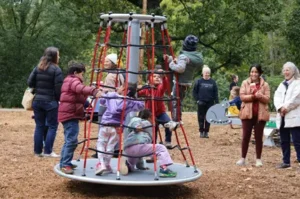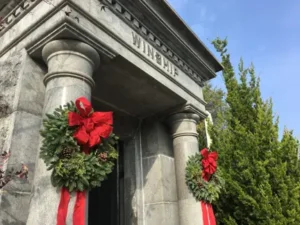By Robert M. Sarwark
U.S. Senate candidate Jon Ossoff
The attendees of November 2019’s Grant Park Neighborhood Association monthly general meeting were visibly surprised to see a new face in the crowd: Jon Ossoff. When then GPNA president Michelle Kirby asked any new neighbors to introduce themselves, Mr. Ossoff rose and announced that he and his wife, Dr. Alisha Kramer, an OB/GYN physician at Atlanta’s Grady Hospital, had moved to the area earlier in the year. Before taking his seat, he also announced that he was running to represent Georgia in the United States Senate as a Democrat against incumbent Republican David Perdue.
Ossoff was born in 1987 in Atlanta and raised in unincorporated DeKalb County (Northlake). He obtained a Bachelor of Science degree from Georgetown University’s School of Foreign Service in 2009 and a Master of Science from the London School of Economics in 2013. After graduate school, he returned to the U.S. to take up the mantle as managing partner and CEO of Insight TWI, “an investigative film company which has produced investigations on corruption overseas,” according to a 2017 profile by Business Insider.
In early 2017, after Congressman Tom Price had vacated his seat as representative of Georgia’s Sixth District to serve as Secretary of Health and Human Services (HHS) under the Trump Administration — Price would resign only months later, in late 2017, after revelations of gross fiscal impropriety — Ossoff declared his candidacy as a Democrat in that district’s special election. Though Ossoff ultimately lost to former Georgia Secretary of State Karen Handel, the competition was fierce, with a surprisingly narrow margin for such a markedly Republican-leaning district (51.78% to 48.22%). What’s more, the campaign garnered nationwide attention and was widely viewed as an early referendum on Donald Trump’s election in 2016. Both candidates saw record-breaking amounts of funding injected into their campaign efforts, in all totalling $51 million.
So who is Jon Ossoff, as a neighbor and as a candidate? I spoke with him recently over the phone to find out more. (This interview has been edited for clarity and length. As a reminder, the general election is Tuesday, November 3rd, 2020.)
Porch Press: What made you decide to move to Grant Park?
Jon Ossoff: Well, I’ve always loved the area and it’s really convenient for [my wife] Alisha because it’s so close to Grady Hospital, where she does most of her clinical work. I love the Park. I’ve got a lot of friends in the area and just love the neighborhood.
PP: You grew up in the area. Were you familiar with this particular neighborhood going back to when you were a kid or was it more something that you came across as an adult?
JO: Oh no, I’ve known Grant Park for a long time. I grew up in DeKalb and Fulton Counties. I spent my childhood both in north DeKalb County and in Inman Park. I went to school over in Druid Hills, lived by Emory for a while when Alisha was in med school, and have a lot of friends in Grant Park, East Atlanta, along Memorial Drive, Cabbagetown…so these are old stomping grounds for me.
PP: Do you have a favorite spot in the neighborhood?
JO: We’re really close to the Park so the go-to places for a cup of coffee, like if we’re going for a walk, are Grant Park Coffee House and Little Tart. We love Mediterranea if we’re going to splurge for dinner out — and we’re just a few minutes’ walk from there. And I’m really excited to see how things continue to evolve at the Beacon.
PP: Obviously we’re in a tough time economically — there’s a lot at stake right now [due to the Covid pandemic]. Could you tell me about what your plan is, as Senator, to help us get out of this hole we’re in?
JO: First of all, we need to trust and empower medical and public health experts when we’re in a public-health emergency. The federal government, under its present leadership — President Trump and Senator Perdue — denied and ignored the relevant medical science and epidemiology, misled the public about the scope of the threat, and failed to adequately prepare. That abysmal public-health response has compounded the economic devastation. As long as this virus is running amok, uncontained, the economic damage continues to mount. So the first step in public-health response is informed by public-health expertise. And had we had strong leadership that acted swiftly in the early weeks, on the recommendation of epidemiological experts, then this could’ve been contained. It didn’t have to be this way. The answer now is to empower those public-health experts to lead and guide the response and to provide desperately needed support for families and small businesses that are struggling right now. It blows my mind that with PPP small business loans having stopped, with extended unemployment benefits having expired, with local schools opening with basically no federal support, with local and state governments crying out for help from the federal government, Senator Perdue and the United States Senate are on vacation.
PP: Speaking of healthcare, once we get more stabilized with this pandemic, looking further on — let’s say a year from now — what would you see as a success in terms of institutional or infrastructural healthcare-policy?
JO: We need to get to 100% health insurance coverage. We need to reduce the price of insurance and prescription drugs. And we need to solve the healthcare access problem. Here’s how we do that: First of all, expand Medicaid. Second, we invest in new clinics, and in an expansion of the U.S. public-health service to get healthcare infrastructure and frontline medical workers into underserved communities. Third, we crack down on price-gouging by drug and insurance companies. Fourth, we add a public option to the ACA [Affordable Care Act] exchange to add more choice and competition — and that public option will be universally affordable and free for Medicaid recipients. This will get us to 100% health insurance coverage instantaneously.
PP: Thinking about the Atlanta metro area, what would be the first major project or initiative that you would start with in office? What does Atlanta need the most as the engine that powers the rest of the state of Georgia?
JO: What I’m most excited about delivering in the Senate is infrastructure investment. We need a historic American infrastructure plan — and that will deliver significant resources for transit, for affordable housing, for clean energy, for green space, for environmental clean-up, for mixed-income development — so that the growth of Georgia’s metropolitan areas doesn’t displace deeply rooted and established communities — especially Black communities where property values and rents are increasing due to economic growth. We can make Georgia a clean-energy leader while connecting the Atlanta metro area with the rest of the state with new light-rail projects, innovative electric transit projects, and cutting-edge infrastructure that upgrades our quality of life and makes Georgia’s economy more efficient, more sustainable, and that promotes the growth of our logistics and technology sectors and lays the groundwork for prosperity for decades to come.
PP: Is there anything else that you think that folks should know about you, considering you are one of our neighbors?
JO: Please convey to everyone that Alisha and I send our love and best wishes, especially to everyone whose health has been impacted, who have had loved ones who’ve been infected, and whose businesses have been severely impacted by this crisis. I hope people also know that one of my top priorities will be healing…our city, our state, our country…bringing people together again and uniting this country behind an agenda that the majority already supports. This includes strengthened civil rights laws, strengthened voting rights laws, and criminal justice reforms to redress race and class bias in our criminal justice system, and to protect voting rights, which are under attack in Georgia and across the country.
PP: I appreciate you taking the time to talk with me.
JO: Thank you so much. I appreciate it and your journalism.










Comments are closed.